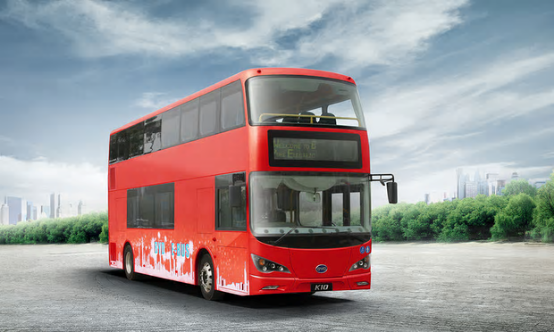By Tom McGregor, CCTV.com Panview commentator and editor
Europeans are well known for supporting eco-friendly policies. They have pioneered efforts to introduce laws on stricter pollution control and encouraging people to lead green lifestyles.
Europe has been the launching pad for global Green Energy initiatives, such as constructing wind farms, solar plants and subsidizing electric vehicles (EV) manufacturers.
Yet, the world's leading EV company does not hail from Europe, but from China. Shenzhen-based BYD has leaped to the top of the field in the sector.
Major metropolitan areas in Europe have revamped public transportation to make the commute more Green, but still reliable and cost-effective.
There's been a big move to convert gas and diesel buses into coaches that are electric-charged. The London Transport Authority purchased 51 BYD ebuses in 2015 with plans to buy more.

(The world’s first pure electric zero emission double-decker bus, designed and built by BYD, entered service in London in October 2015 Photo provided by DYB)
Double-deckers go electric
A London bus is more than a bus, since many are designed as double-deckers and painted in red. They have become an iconic trademark for the City's tourism.
Nonetheless, building electronic double-deckers had been no easy task, since it required innovative hi-tech upgrades to make it feasible for London Metro while keeping passengers comfortable.
"In the past, electric vehicle manufacturers have produced electric buses with three batteries - at the vehicle's front, back and top - but this design would not work with the double-decker bus," Isbrand Ho, managing director of BYD Auto Europe told the Guardian newspaper.
Ho added, "BYD's advanced technology is able to make the batteries more compact, so the battery on top of the bus is no longer required."
Breathe of fresh air
BYD has already impressed British officials, the local business community and environmentalists, including Denis Naberezhnykh, head of the ultra-low emissions vehicle and intelligent transportation system technologies.
"A purely electric double-decker bus not only provides further options for the electrification of London's bus fleet, but with growing pressure to improve air quality in cities. It provides another way of reducing emissions," said Naberezhnykh.
BYD has installed charging stations at every bus station and depot along its bus routes. Drivers can recharge vehicles in just 10 seconds, which allows them to drive for another 5 kilometers even in heavy urban traffic.
The company, CSR Zhuzhou Electric Locomotive, located in central China's Hunan Province, developed the world's fastest re-chargers for buses and upgraded super-capacitor devices that can recycle potential energy for them.
The organic supercapacitor has a service life of 12 years, providing fuel savings - US$200,000 for its entire life cycle.
BYD's British fans
Go-Ahead, the UK's leading public transportation provider, had signed a deal with BYD.
"We believe the BYD’s battery and related technologies are state-of-the-art currently and importantly are well-proven in thousands of buses in service around the world," John Traynor, general manager of Go-Ahead, told China Daily.
His company ordered 51 BYD units in 2015 and another 45 in 2017. As of August 2017, BYD has 201 electric buses running in the UK. The company also operates in other European nations, such as the Netherlands, Spain, Denmark, Finland, Poland and Serbia.
"The combination of BYD’s electric power-train and batteries and the ADL (Alexander Dennis Limited, Britain's biggest coach manufacturer) bodywork provides us with high-quality buses, which have proven reliability in operations," added Traynor.
Viable economic environmentalism
"Considering the UK is undergoing a revolution of clean air, the electric coaches from China have proved to be more economical and environmental-friendly than diesel ones," said Traynor. "In fact, the electricity those coaches need is lower than the manufacturers predicted."
BYD's expansion in the UK coincides with London's pledge to ban gas and diesel cars by 2040. BYD already meets rigorous EU (European Union) standards on vehicle emissions.
All BYD ebuses run on pure zero emissions. Experts believe they can save 70 percent on fuel costs, making them cheaper to own than gas and diesel buses in the long-term.
All buses get fully-recharged at night during off-peak electricity consumption hours. They require four hours to recharge, but expected to drive all day on a single route.
BYD, founded in 2003, has big plans to expand Europe-wide.
Set for continued success
BYD is not the only electricity bus manufacturer in China. In 2015, according to CleanTechnica Website, 15 Chinese ebus companies have sold more than 100 units each.
The domestic ebus market is rapidly growing, with a big jump in exports to Europe, while sales in China are soaring too.
The City of Shenzhen has ordered 100,000 electric buses in 2015, while experts forecast the likelihood of all buses in the country to be electric by 2025.
Beijing has provided generous subsidies and encouraged more private investments for ebus manufacturers. BYD is expected to play a leading role in the sector.
Many Europeans are happy to ride ebuses, which they find comfortable, reliable and relatively cheap. That’s good business for public transport passengers, but also a breathe of fresh air for our ecology.
Tmcgregorchina@yahoo.com
(The opinions expressed here do not necessarily reflect the opinions of Panview or CCTV.com. )

Panview offers a new window of understanding the world as well as China through the views, opinions, and analysis of experts. We also welcome outside submissions, so feel free to send in your own editorials to "globalopinion@vip.cntv.cn" for consideration.
















